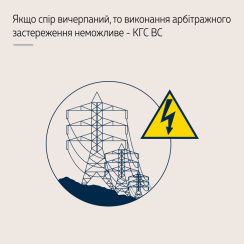Contact center of the Ukrainian Judiciary 044 207-35-46

In case No. 910/17566/17 the firm G+H MONTAGE GmbH applied to commercial court with claim to Enerhoatom Company (with the participation of the third person, which did not submit a separate claim as for the subject of the dispute on the defendant’s behalf – “Chernobyl Nuclear Power Plant” State Specialized Enterprise) on the recovery of 39 392 033. 31 UAH, of which 3 181 737.81 UAH are 3 % of annual expenditures and 36 210 295.50 UAH are inflationary losses for the violation of compliance with the monetary obligations for the period from 26 March 2002 till 9 October 2017.
By the ruling of local commercial court the statement of claim was left without consideration on the grounds of Item 7 of Part 1 of Article 226 of the Commercial Procedure Code of Ukraine.
Appeal court cancelled the ruling of the local commercial court by its resolution and transferred the case files to the Commercial Court of Kyiv city for further consideration.
Having considered the cassation appeal of the defendant, the panel of judges of the Commercial Cassation Court within the Supreme Court decided to uphold the appealed resolution of the appeal court, since arbitral agreement on the transfer of dispute to arbitral court was not the refusal from right to apply to court, but one of ways to exercise the right to protect one’s rights. With regard to the abovementioned, the parties have only legal option, but not an obligation, to solve their dispute in arbitral procedure. Herewith, the restriction of right to apply to commercial court shall not be permitted.
The lack of mutual consent of the dispute parties for its solving by commercial court (arbitral procedure) executed with relevant arbitral caution, irrespectively on the preliminary agreement on this, excludes the possibility of the dispute consideration by such court.
In case of the lack of such caution, commercial court is obliged to terminate proceedings only in case of existence of both parties’ will as for consideration of a certain dispute in arbitral procedure executed in the form of relevant application to court.
Pursuant to Part 2 of Article 1 of the Law of Ukraine “On International Commercial Arbitration” disputes resulting from contractual and other civil law relationships arising in the course of foreign trade and other forms of international economic relations, provided that the place of business of at least one of the parties is situated abroad, as well as disputes arising between enterprises with foreign investment, international associations and organizations established in the territory of Ukraine; disputes between the participants of such entities; as well as disputes between such entities and other subjects of the law of Ukraine may be referred to international commercial arbitration
The appeal court found that the Firm in its statement of claim justified its demands with the violation of obligation by the Company to pay 6 818 943.70 UAH, which had appeared from the judgment of the Arbitration Institute of the Stockholm Chamber of Commerce of 17 July 2000 and had been recognized on the territory of Ukraine by the ruling of the Appeal Court of Kyiv city of 5 November 2001 with the issuance of execution order (taking into account the ruling of the Appeal Court of Kyiv city of 26 March 2002 on changing the way of execution of the judgment of the Arbitration Institute of the Stockholm Chamber of Commerce of 17 July 2000 from currency into UAH).
Thus, the appeal court concluded that the claim in this case is not covered by terms of the arbitral caution, since the dispute on the violation of contract had already been solved in the favour of the Firm by the judgment of the arbitral court of 17 July 2000 and had been exhausted; therefore, the execution of such a caution in the specified form was impossible.
Follow the link http://www.reyestr.court.gov.ua/Review/79250052 to see the full text of the Resolution of 15 January 2019.